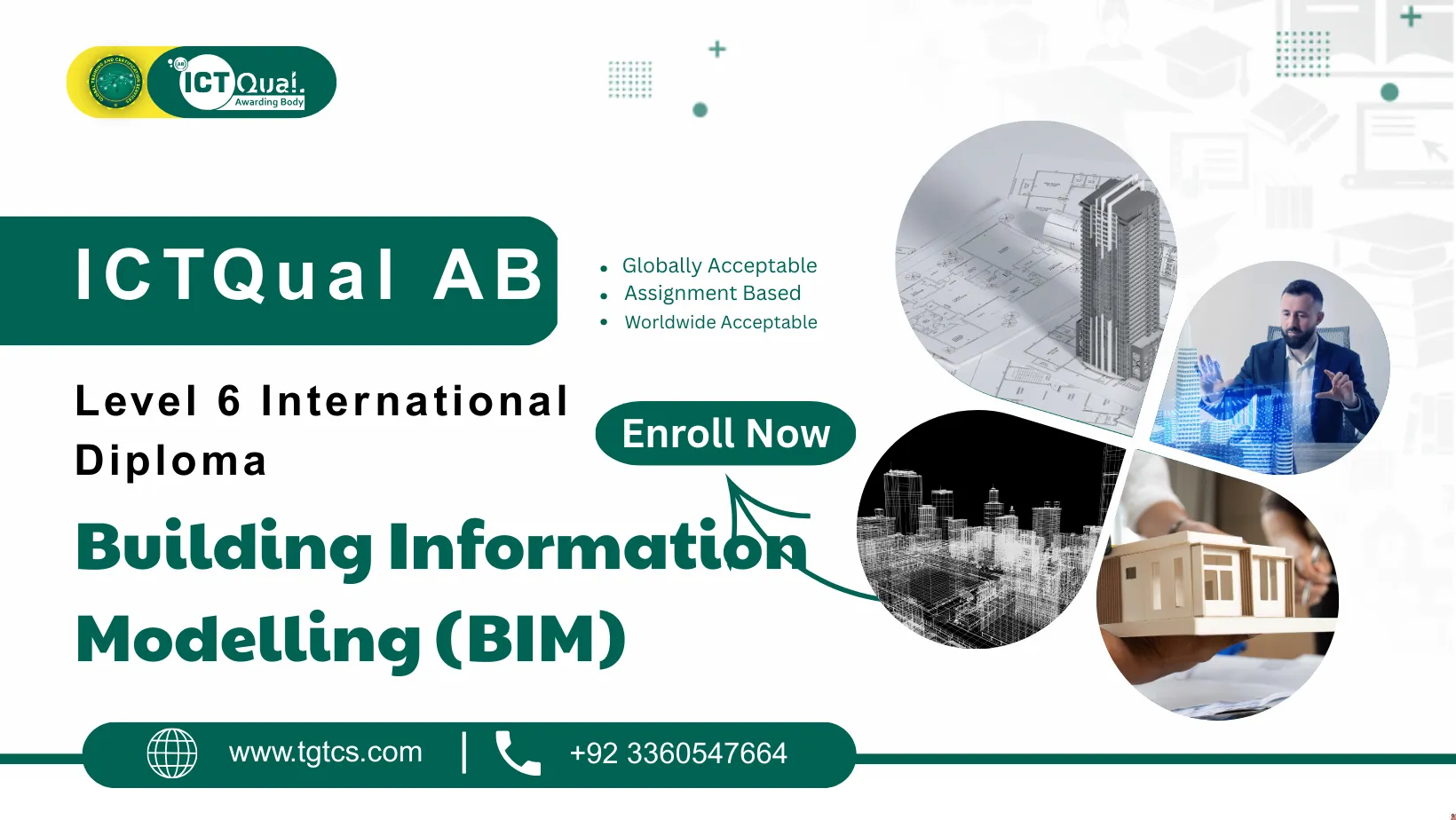ICTQual AB Level 6 International Diploma in Building Information Modelling (BIM)
The ICTQual AB Level 6 International Diploma in Building Information Modelling (BIM) is a globally recognized qualification designed to equip learners with advanced knowledge, technical expertise, and strategic insights into the world of digital construction and project management. As the construction industry rapidly shifts towards digital transformation, the demand for skilled professionals in BIM management, BIM implementation, and integrated project delivery has never been greater.
This diploma focuses on both the theoretical foundations and practical applications of BIM across civil, architectural, and infrastructure projects. Learners will explore essential areas such as BIM project planning, 3D and 4D modelling, data management, collaborative design, digital workflows, and sustainable construction practices. ICTQual AB Level 6 International Diploma in Building Information Modelling (BIM) also covers international BIM standards and regulations, preparing professionals to meet global industry requirements with confidence.
Through assignment-based learning, candidates will develop the ability to manage BIM processes, coordinate multidisciplinary teams, analyze project data, and apply innovative digital solutions to real-world construction challenges. The course also emphasizes leadership, decision-making, and problem-solving skills, ensuring learners are ready to take on advanced roles such as BIM Manager, Project Coordinator, or Digital Construction Specialist.
Whether you are a fresh graduate aspiring to build a career in construction technology or an experienced professional aiming to upgrade your expertise, the ICTQual AB Level 6 Diploma in BIM provides the pathway to professional growth, global recognition, and enhanced career opportunities. With its British Council verification, MOFA and Embassy attestation, and international job relevance, this program is the ideal choice for advancing in today’s competitive construction and digital engineering industries.
The Global Training and Certification Services is Approved Training Centre of ICTQual AB UK Ltd
The ICTQual AB Level 6 International Diploma in Building Information Modelling (BIM) is designed to provide learners with advanced knowledge, technical skills, and professional expertise essential for success in the modern construction and digital engineering industry.
Introduction
- The ICTQual AB Level 6 International Diploma in Building Information Modelling (BIM) is a globally recognized qualification designed for careers in digital construction and project management.
- BIM is a growing demand in the global construction industry, and this diploma equips learners with the technical expertise and leadership skills to excel.
Key Features of the Qualification
- A total of 360 credits, making it a comprehensive advanced-level diploma.
- Fully assignment-based, allowing learners to study and complete tasks at their own pace.
- Accessible to learners from any location worldwide.
- The diploma is British Council verifiable, MOFA and Embassy attestable, making it highly valuable for jobs, career mobility, and Iqama approval.
Pathways for Learners
- Fresh students: Must complete all 36 mandatory assignments within three years, covering BIM principles, digital modelling, collaborative processes, data management, and sustainable construction.
- Experienced professionals: Those with at least six years of verifiable industry experience can take the fast-track route by defending their expertise in professional discussion meetings with ICTQual AB-approved assessors, without completing all assignments.
Benefits of the Diploma
- Builds advanced technical knowledge in Building Information Modelling (BIM).
- Strengthens leadership, management, and decision-making skills.
- Provides internationally recognized certification for global career advancement.
- Flexible study design suitable for both fresh learners and working professionals.
The ICTQual AB Level 6 International Diploma in BIM is a powerful career-building qualification that opens doors to opportunities in digital construction, engineering, and project management. Whether you are starting your professional journey or seeking to formalize years of experience, this diploma provides the recognition, knowledge, and confidence to succeed globally.
Mandatory Unit
This qualification, the ICTQual AB Level 6 International Diploma in Building Information Modelling (BIM)e, consists of 36 mandatory units.
Year 1 – Foundation in Building Information Modelling (BIM)
- Principles of Building Information Modelling
- Introduction to Digital Construction Projects
- Construction Materials and Methods for BIM
- Project Planning and Scheduling in BIM
- Risk Assessment and Management in Digital Projects
- Health, Safety, and Environmental Awareness
- BIM Communication and Stakeholder Management
- Construction Technology Fundamentals
- Financial Management in BIM Projects
- Quality Assurance and Control in BIM
- Legal and Regulatory Frameworks in Construction
- Professional Ethics and Conduct in Digital Construction
Year 2 – Intermediate BIM Practices
- Advanced BIM Modelling Techniques
- Resource Management and Allocation in BIM Projects
- Project Cost Estimation and Budgeting using BIM
- Construction Contract Administration in Digital Projects
- Procurement and Supply Chain Management in BIM
- Project Risk Analysis and Mitigation
- Leadership and Team Management in BIM Environments
- Site and Workshop Management with BIM Integration
- Sustainability and Environmental Management in BIM Projects
- Project Monitoring and Reporting using Digital Tools
- Problem-Solving and Decision-Making in BIM Projects
- Communication and Negotiation Skills in Digital Construction
Year 3 – Advanced BIM and Strategic Leadership
- Strategic BIM Management in Construction Projects
- Advanced Construction Project Design with BIM
- Infrastructure Project Management using BIM
- Innovation and Emerging Technologies in BIM
- Advanced Risk and Crisis Management in Digital Projects
- Contract Management and Legal Compliance for BIM
- Leadership in BIM-Driven Construction Projects
- Advanced Project Control and Performance Measurement
- Project Governance and Compliance in Digital Construction
- Research Methods and Project Analysis for BIM
- Capstone Project in Building Information Modelling
- Professional Development and Career Planning
The following learning outcomes detail the specific knowledge, skills, and practical capabilities learners will gain upon completing each unit of the diploma.
Year 1 – Foundation in Building Information Modelling (BIM)
Principles of Building Information Modelling
- Understand the core concepts, standards, and methodologies of BIM.
- Apply BIM principles in planning and managing construction projects.
- Recognize the role of BIM in improving collaboration and project efficiency.
- Analyze case studies of BIM implementation in real-world projects.
Introduction to Digital Construction Projects
- Identify digital tools and technologies used in modern construction.
- Understand project workflows in digital construction environments.
- Apply basic digital project management principles.
- Assess the benefits and challenges of digital project adoption.
Construction Materials and Methods for BIM
- Understand common construction materials and their integration into BIM models.
- Apply BIM methods to simulate construction processes.
- Analyze material performance and sustainability using BIM.
- Plan project sequencing based on construction methods and digital modelling.
Project Planning and Scheduling in BIM
- Develop project schedules using BIM-based tools.
- Apply techniques for task sequencing, resource allocation, and timeline optimization.
- Evaluate project timelines for efficiency and feasibility.
- Integrate scheduling with digital collaboration platforms.
Risk Assessment and Management in Digital Projects
- Identify potential project risks using BIM tools.
- Develop mitigation strategies and contingency plans.
- Apply risk management principles to real-world BIM projects.
- Monitor and update risk registers within digital project platforms.
Health, Safety, and Environmental Awareness
- Understand occupational safety requirements in construction projects.
- Apply BIM for planning safety measures and hazard identification.
- Evaluate environmental impacts using digital modelling.
- Integrate safety and sustainability practices into project workflows.
BIM Communication and Stakeholder Management
- Facilitate collaboration between project stakeholders through BIM platforms.
- Develop clear project communication plans.
- Manage stakeholder expectations using digital project data.
- Report progress and issues effectively through BIM dashboards.
Construction Technology Fundamentals
- Understand construction technologies used in BIM integration.
- Apply digital tools for modelling, simulation, and project analysis.
- Evaluate technological solutions for efficiency and cost-effectiveness.
- Develop workflows integrating multiple construction technologies.
Financial Management in BIM Projects
- Apply cost estimation and budgeting techniques using BIM.
- Monitor project expenditures and resource utilization.
- Analyze financial reports and forecasts in digital projects.
- Optimize budget allocation through BIM-based simulations.
Quality Assurance and Control in BIM
- Develop QA/QC plans for digital construction projects.
- Apply quality monitoring using BIM tools and workflows.
- Identify deviations and implement corrective actions.
- Maintain compliance with industry standards and project specifications.
Legal and Regulatory Frameworks in Construction
- Understand construction law and regulations affecting BIM projects.
- Apply compliance measures in digital project management.
- Assess contract requirements and legal obligations.
- Integrate legal considerations into project planning and execution.
Professional Ethics and Conduct in Digital Construction
- Demonstrate ethical decision-making in project management.
- Apply professional standards in BIM practices.
- Promote transparency and accountability in digital construction.
Year 2 – Intermediate BIM Practices
Advanced BIM Modelling Techniques
- Develop complex 3D, 4D, and 5D BIM models.
- Integrate multi-disciplinary project data into a unified digital model.
- Apply modelling techniques for visualization, simulation, and coordination.
- Evaluate model performance for project optimization.
Resource Management and Allocation in BIM Projects
- Plan and allocate resources using BIM-based tools.
- Monitor resource utilization and optimize productivity.
- Analyze workforce and equipment requirements digitally.
- Develop resource schedules aligned with project timelines.
Project Cost Estimation and Budgeting using BIM
- Perform accurate cost estimation using BIM models.
- Develop project budgets and financial forecasts.
- Identify cost-saving opportunities using digital tools.
- Integrate cost management with scheduling and resource planning.
Construction Contract Administration in Digital Projects
- Understand contract types and obligations in BIM-driven projects.
- Manage contractual compliance and documentation digitally.
- Apply contract administration techniques for risk reduction.
- Use BIM tools for tracking deliverables and milestones.
Procurement and Supply Chain Management in BIM
- Plan procurement strategies using digital project data.
- Coordinate suppliers, vendors, and logistics efficiently.
- Track material and equipment delivery using BIM systems.
- Optimize supply chain performance through digital monitoring.
Project Risk Analysis and Mitigation
- Conduct comprehensive risk assessments in BIM projects.
- Develop mitigation strategies using digital simulations.
- Monitor and manage risks throughout the project lifecycle.
- Integrate risk reporting into digital project dashboards.
Leadership and Team Management in BIM Environments
- Lead multidisciplinary teams using collaborative BIM platforms.
- Develop strategies to enhance team productivity.
- Resolve conflicts and improve communication digitally.
- Foster a culture of accountability and collaboration.
Site and Workshop Management with BIM Integration
- Plan and manage on-site operations using BIM.
- Coordinate workshop processes and logistics digitally.
- Apply digital monitoring for safety, productivity, and quality.
- Optimize site workflows through model-based simulations.
Sustainability and Environmental Management in BIM Projects
- Apply BIM tools for sustainable construction planning.
- Evaluate environmental impacts and compliance.
- Integrate energy-efficient practices into project design.
- Monitor and report sustainability metrics digitally.
Project Monitoring and Reporting using Digital Tools
- Track project progress through BIM dashboards.
- Generate analytical reports for stakeholders.
- Identify deviations and implement corrective measures.
- Use monitoring tools for performance evaluation and decision-making.
Problem-Solving and Decision-Making in BIM Projects
- Apply critical thinking for resolving project challenges.
- Make informed decisions using BIM data and simulations.
- Evaluate alternatives for efficiency and cost-effectiveness.
- Document and communicate decisions effectively.
Communication and Negotiation Skills in Digital Construction
- Develop professional communication strategies for stakeholders.
- Negotiate contracts, resources, and timelines digitally.
- Facilitate collaboration across teams using BIM platforms.
- Ensure transparency and clarity in project communications.
Year 3 – Advanced BIM and Strategic Leadership
Strategic BIM Management in Construction Projects
- Formulate strategic plans for BIM implementation.
- Align BIM objectives with organizational goals.
- Evaluate the impact of BIM on project success.
- Monitor strategic KPIs and outcomes digitally.
Advanced Construction Project Design with BIM
- Develop integrated designs using advanced BIM tools.
- Coordinate architecture, structural, and MEP elements digitally.
- Optimize design for cost, efficiency, and sustainability.
- Validate designs through simulations and clash detection.
Infrastructure Project Management using BIM
- Apply BIM techniques for large-scale infrastructure projects.
- Coordinate multi-disciplinary teams and contractors digitally.
- Monitor project progress and manage resources effectively.
- Ensure compliance with technical and regulatory standards.
Innovation and Emerging Technologies in BIM
- Explore emerging technologies like AI, IoT, and VR in BIM.
- Apply innovations for enhanced project visualization and management.
- Evaluate the impact of new technologies on project efficiency.
- Integrate cutting-edge solutions into BIM workflows.
Advanced Risk and Crisis Management in Digital Projects
- Develop advanced risk management strategies for BIM projects.
- Simulate potential crises and mitigation plans digitally.
- Monitor and respond to project risks proactively.
- Ensure continuity and resilience in complex projects.
Contract Management and Legal Compliance for BIM
- Administer contracts and legal obligations in BIM-driven projects.
- Ensure regulatory compliance and documentation accuracy.
- Resolve disputes and contractual issues effectively.
- Integrate legal oversight into digital project workflows.
Leadership in BIM-Driven Construction Projects
- Lead high-performing teams using digital collaboration tools.
- Develop leadership strategies for complex projects.
- Foster innovation and accountability in BIM environments.
- Mentor and train team members in BIM practices.
Advanced Project Control and Performance Measurement
- Apply KPIs and performance metrics using BIM dashboards.
- Monitor timelines, costs, and quality in real-time.
- Identify and correct project deviations effectively.
- Integrate continuous improvement strategies in BIM projects.
Project Governance and Compliance in Digital Construction
- Implement governance frameworks for BIM projects.
- Ensure compliance with standards, policies, and best practices.
- Monitor organizational and project-level compliance digitally.
- Develop reporting structures for accountability and transparency.
Research Methods and Project Analysis for BIM
- Conduct applied research in digital construction and BIM.
- Analyze project data to improve efficiency and outcomes.
- Develop evidence-based strategies for project optimization.
- Present research findings to stakeholders professionally.
Capstone Project in Building Information Modelling
- Plan, execute, and complete a comprehensive BIM project.
- Apply all skills learned across modelling, management, and leadership.
- Present findings, solutions, and project outcomes effectively.
- Demonstrate readiness for professional BIM roles globally.
Professional Development and Career Planning
- Develop career strategies in BIM and digital construction industries.
- Identify professional development opportunities and certifications.
- Build networks and personal branding in the global construction market.
- Plan for continuous learning and skill advancement in BIM.
The ICTQual AB Level 6 International Diploma in BIM offers learners advanced knowledge, practical skills, and professional recognition in the digital construction industry.
Advanced Technical Skills
- Develop expertise in BIM modelling, 4D/5D simulations, and digital project management.
- Apply BIM tools to optimize construction processes, collaboration, and project efficiency.
Leadership and Management
- Enhance project leadership, decision-making, and team management skills.
- Lead multi-disciplinary teams in complex construction projects using digital tools.
Career Advancement
- Gain a globally recognized qualification verifiable by the British Council and attested by MOFA and Embassies.
- Increase employability and professional credibility for jobs and Iqama approval in Gulf countries.
Flexibility and Accessibility
- Study at your own pace with fully assignment-based learning accessible worldwide.
- Suitable for both fresh learners and experienced professionals seeking fast-track certification.
Industry Recognition
- Stay ahead with knowledge of cutting-edge BIM technologies and sustainable digital construction practices.
- Align skills with global construction and project management standards.
This diploma equips learners with the expertise and credentials needed to excel in digital construction and BIM-focused roles worldwide.
The ideal learners for this program are those seeking advanced careers in digital construction, BIM, and project management.
Aspiring BIM Professionals
- Individuals aiming to start a career in Building Information Modelling and digital construction.
- Fresh graduates or early-career professionals seeking internationally recognized qualifications.
Experienced Construction Managers
- Professionals with practical construction experience looking to formalize expertise in BIM.
- Individuals seeking a fast-track route by demonstrating prior industry experience and knowledge.
Project Leaders and Team Managers
- Those responsible for leading construction projects and multi-disciplinary teams.
- Professionals looking to enhance project leadership, communication, and decision-making skills.
Career Changers and Entrepreneurs
- Individuals looking to transition into digital construction, BIM consultancy, or project management roles.
- Entrepreneurs planning to integrate BIM processes into their construction or engineering businesses.
This diploma provides learners with the technical knowledge, leadership skills, and global recognition required to thrive in the rapidly evolving field of Building Information Modelling.
Course Overview
Course Level
Level 6
Course Units
36 Units
Credits
360
Duration
3 years






